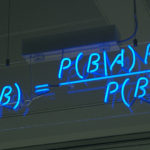How Human Free Will Harmonizes with “Sufficient Reason”
by Dr. Dennis Bonnette
Filed under Man

This article’s sole purpose is to defend free will against the claim of those who maintain that free will is metaphysically impossible, because it somehow violates the principles of sufficient reason and causality.
Arguments Against the Harmony
The most forceful argument against free will’s possibility is the claim that it violates Thomistic metaphysics’ understanding of the principle of sufficient reason. That principle states that every being must have a sufficient reason for its being or coming-to-be.
For St. Thomas Aquinas, the will is simply the intellectual appetite. The will desires the good as intellectually apprehended. While the will is necessitated in its movement toward the universal good, with respect to lesser goods it is free to choose this or that one, or to reject any at all.1
The problem of free will metaphysically is to explain how a free choice can come-to-be without it being ultimately determined by God or by some other external or internal cause, not by the free will of the human being who makes it.
Since a person is in potency to his choice before he makes it, the question arises as to how he can possibly be moved from potency to act (from not yet having made his choice to having made it), without being moved by another. Since whatever is moved is moved by another, a human being cannot move himself from potency to act. But if he is moved by another to make his choice, how can the choice be said to be free and of his own making?
Although the will is a secondary cause, even secondary causes must be moved from potency to act. Now, it is argued that, since God makes creatures to act in accordance with their own natures, he makes free agents to be and to operate in accord with their free natures – so that they are true agents of their own choice.2
Still, in choosing between alternative goods, the human free will must become inclined to one rather than another. It is claimed man is free to choose because God sustains his free agency as he makes the choice.3
Nonetheless, if the human will is truly open to choose this or that object, such that it is not forced to one rather than the other, what, then, inclines it to one or the other alternative? It cannot be itself, since its “freedom” precisely entails not being forced or inclined with necessity to one option or another. Hence, when it begins to move in one direction or another, something other than itself must move it – which means that it does not move itself, but another so moves it. If that is so, then how can the will really be free, since its choices appear not to be made by itself, but by another?
Metaphysically, the problem with free will is that the will must first be open to its choice, and then, must give to itself that which it does not initially possess, namely, a dominating inclination to one good rather than another. Nothing can give to itself what it does not have, and hence, free will is impossible. Even if God sustains the person and his will, together with all conditions attendant to the will’s act, some final inclination must come-to-be which was not there before. Since nothing can give to itself what it lacks, that new and final inclination must not come from the person choosing, but from something else. That something else must be some internal precondition or external agent. Either way, free will appears to be a chimera.
To the Thomistic metaphysician (and to right reason), nothing is more true than metaphysical first principles. Thus, an argument against free will based on such principles appears irrefutable. For example, genuine freedom violates the first principle that you cannot get being from non-being, that is, a new specification from a will previously not so specified. Self-specification is impossible, since nothing can give to itself that which it lacks. But, if the will receives its specification from another, then it cannot be free.
Secondary Causes are True Causes of Their Effects
Still, the free act itself must be carefully analyzed – to see whether genuine freedom truly violates basic metaphysical principles.
Importantly, secondary causes are true causes of the changes they produce.4 Merely raising one’s arm produces “new existence” or a “new expression of reality” just by the arm’s position change. In another Strange Notions article, I demonstrate that this “new existence” requires an Ultimate Cause of all finite being, a “universal donor” of finite modes of existence that did not previously exist. This “donor” provides the novel perfection of reality that the arm’s new position entails.
Yet, the limitations, under which that “new existence” is expressed, come, not from God, as the universal source of new existence, but from the finite agent who moves his arm. That is, the limited expression of this new perfection of existence comes from the limited being of the person moving his arm (with existential assistance from God). It is the human being who moves his arm and it is his arm that is moved – not God’s arm!
Secondary causality’s essence is that God enables finite agents actually to cause their own effects, even though they cannot do so all by themselves. Secondary, finite causes are true causes of their effects. Secondary causes are not mere puppets. This helps explain how human free will is able to act freely, even though it cannot act all by itself.
Clarifications
First, so-called “free choice” is not really free. It is called “free” through extrinsic denomination, that is, because it is produced by free will. By the time one makes his choice, the choice is already determined to be what it is. The will determines the choice. The choice does not determine itself. Free will is simply the power that makes such choices independent of any secondary causal agency forcing its decision.
Second, the free will cannot act unless God moves it to act by giving it the natural inclination toward the good -- and even then only when the intellect apprehends a finite good to be embraced or rejected. We always want the perfection, but can reject the finite good because of its imperfection.
Third, the practical context of choice is like picking between chocolates, when someone says, “Pick one.” If you pick a cherry cordial, you get its unique flavor to enjoy. Still, at the same time, you deny yourself the sensitive good of a caramel. If you pick the caramel, you lose the cordial. These are finite goods. Since the will is necessarily ordered solely to the universal good (which is ultimately God himself), lesser goods can be rejected.5
Free Will Is Metaphysically Possible
Since the free choice itself is actually determined by the free will, it is the exercise of free will that must be examined carefully in order to determine if free will is metaphysically possible.
In its exercise, the will is confronted with finite goods, which do not necessitate its appetite to choose them. Because of their limited natures, they present both perfections, which attract, and imperfections, which permit rejection. Inherent in the nature of the intellectual appetite, or will, is that it is not necessitated by limited goods, but by the universal good alone.6
No extrinsic cause forces the will to choose this rather than that finite good. God sustains the will’s nature and moves it to choose by presenting goods to it through intellectual apprehension. But no extrinsic cause – not even God himself – inclines the will to choose necessarily this or that finite good.
Antecedent conscience is the last practical judgment of the intellect judging the moral lawfulness of a human act to be performed here and now. Still, since the will is attracted by the good present both in the morally correct choice and also in the morally evil alternative, and since neither option compels with necessity, no secondary cause but the will itself is responsible for the choice actually made.
Therefore, in the order of secondary causes, the will alone is responsible for its choices.
The free will is not a power existing in a vacuum. It is a property and power of the human being making his free choices through its exercise. Hence, it is the human person himself who bears responsibility for choices he makes through the exercise of his free will.
The metaphysical principle of sufficient reason not violated. The choice itself has a sufficient reason in that it is determined by the free will. The various components of the free will in its exercise never violate this principle either. The reason the will is moved to choose and to choose freely is God who sustains its nature and moves it to choose without necessitation by presenting it with intellectually apprehended finite goods.7
But it is precisely because there is no efficacious secondary cause whatever that moves the intellect to prefer one finite good to another that there is no sufficient reason forcing the will to choose one way or another. Yes, the intellect apprehends reasons both pro and con with respect to the finite goods that are considered as means. But none of these are necessitating reasons, because the intellect also sees the reasons that support the alternative choice. There is no adequate and sufficient reason forcing the will to embrace one alternative choice over another, even though the conscience declares which choice is morally good, and thus, which alternative ought to be chosen.
Indeed, it is precisely the absence of any sufficient reason forcing the will’s specific choice that guarantees that the human will’s genuine freedom in seeking the good is possible.
Conclusion
Finally, some may foolishly argue that -- lacking any sufficient reason as to why a given option is chosen -- free choice is merely a matter of pure chance! But, this is absurd, since the hallmark of chance is that it lacks all intentionality. To the contrary, free choice is fully intentional in that it is based on clearly understood motivations provided by the various reasons the intellect considers as it ponders various possible courses of action.
To the objection that “you cannot get being from non-being, that is, a new specification of the will from a will previously not so specified,” the answer lies in the fact that the will gets its specification from the intellect. Various alternative actions are already considered by the intellect. In choosing one as opposed to the others, the will does not get its specification from non-being, but rather from the being of an alternative already understood. It is, then, an already existing “specification,” which becomes the chosen course of action.
To the objection that “some final inclination must come-to-be which was not there before,” the same answer is given. The final inclination is simply one of the alternative actions already known by the intellect. God moves the will to exercise its own proper act of choosing, and since it is necessitated by no finite alternative, it is free to make one of those already existing “inclinations” its “final” choice.
The free will is moved to choose, but it is not moved in a violent way or contrary to its own inclination.8
The choice made has a sufficient reason, namely, the exercise of the free will that is moved to make a choice by God giving it the natural inclination to desire the good found in the alternatives.9 But to say that the sufficient reason for the choice made lies in the exercise of the free will is not the same as saying that there must be a sufficient reason why one alternative is chosen over another.
Rather than operating in violation of the metaphysical principle of sufficient reason, human free choice is possible precisely because there is no sufficient and efficacious reason why, considered in itself, it must choose one finite good over another.
Three truths must be kept in mind here:
(1) God’s transcendent efficient causality encompasses all created being, including the least movement of the human will – and this it does move “sufficiently and efficaciously.”10 Thus, any conception of free will that asserts that the will makes its decisions with complete existential autonomy violates not only sufficient reason, since it fails to admit that God moves the will, but also the absolute creative omnipotence of God over each and every finite thing.
(2) The human will is inherently free in its choice of finite goods because no finite good is its natural end. The universal good, God, alone is.
(3) The will moves itself from potency to act in choosing finite goods, but only insofar as God moves it as a secondary cause whose nature is free with respect to choosing finite goods.11
Thus, God’s transcendent efficient causality in no way violates the will’s exercise of its free choice.
As philosopher Peter Pagan explains:
“Insofar as the created act of the will is without defect, it can have two efficient causes, provided that the causes are not of the same order. The Creator operates, and the spiritual creature cooperates, there being no real conflict. … The spiritual creature's real contribution does not logically preclude the antecedent operation of God's transcendent efficient causality. (See St. Thomas, S.Th., I, q. 83, a. 1, ad. 3.) If we were dealing only with efficient causes of the same order of being (univocal), however, there would be a real philosophical problem.”12
A morally good choice entails God causing the motion of the will and the will simply conforming to that motion with a perfectly natural concurrence based on its own natural inclination toward the perfective good.
Dr. Pagan continues, “Moreover, insofar as the spiritual creature's act includes some moral imperfection or privation of due order, the defective act qua defective does not demand an efficient cause, but only a deficient cause, which is not God. Also see St. Thomas, S.Th., I, q. 49, a. 1, corp. et ad 3.”13
As for the defective choice, the motion of the will is "deflected" from a proper means by reason of some defect within itself, for example, an inordinate love of carnal pleasure which blinds the intellect to some extent. Thus, the motion of the secondary cause (the free will) is truly its own, even though it is moved to act by God. But, the defect flows from its own defective affection -- so that the means chosen is not properly ordered to man's last end.
These free choices are perfectly natural, since God, as the sole cause of natural agents’ natures, is the sole agent able to enable the free will to be a genuine cause of its own contingent, not necessary, effects.14 God sustains the reduction from potency to act in the will whereby it chooses between the alternatives proposed by the intellect. But he does so in a manner perfectly natural to the will as a true secondary cause of contingent, not necessary effects. Thereby, the human free will exercises its own proper act of choosing – with no violation of the principle of sufficient reason entailed at all.
The foregoing is merely a modest attempt to express some elements of the Thomistic explanation of how free will comports with the principle of sufficient reason, following the penetrating and exhaustive exposition of such eminent contemporary Thomists as Pere Reginald Garrigou-Lagrange.15
Related Posts
Notes:
- Summa Theologiae, I, q. 82, a. 2, ad. 2. ↩
- Summa Theologiae, I, q. 83, a. 1, ad. 3. ↩
- Ibid. ↩
- Summa Contra Gentiles, III, ch. 69. ↩
- Summa Theologiae, I, q. 82, a. 2, ad. 2. ↩
- Ibid. ↩
- Summa Theologiae, I, q. 83, a. 1, ad. 3. ↩
- Summa Theologiae, I, q. 105, a. 4. ↩
- Summa Theologiae, I, q. 105, a. 4, ad. 1. ↩
- Summa Theologiae, I, q. 105, a. 4, c. ↩
- See Steven Long, “Causal Entailment, Sufficient Reason, and Freedom” in The Human Person and a Culture of Freedom, ed. Peter A. Pagan-Aguiar and Terese Auer, (American Maritain Association, 2009), 30-44. ↩
- Private correspondence from philosopher Peter Pagan (12/28/2018). I am indebted to Dr. Pagan for his very helpful suggestions in the writing of this paper. Of course, the views expressed are my own. ↩
- Ibid. ↩
- Summa Theologiae, I, q. 105, a. 4. ↩
- See Reginald Garrigou-Lagrange, God: His Existence and His Nature, Volume II (B. Herder Book Co., 1936), 268-365, 465-562. ↩
Note: Our goal is to cultivate serious and respectful dialogue. While it's OK to disagree—even encouraged!—any snarky, offensive, or off-topic comments will be deleted. Before commenting please read the Commenting Rules and Tips. If you're having trouble commenting, read the Commenting Instructions.












